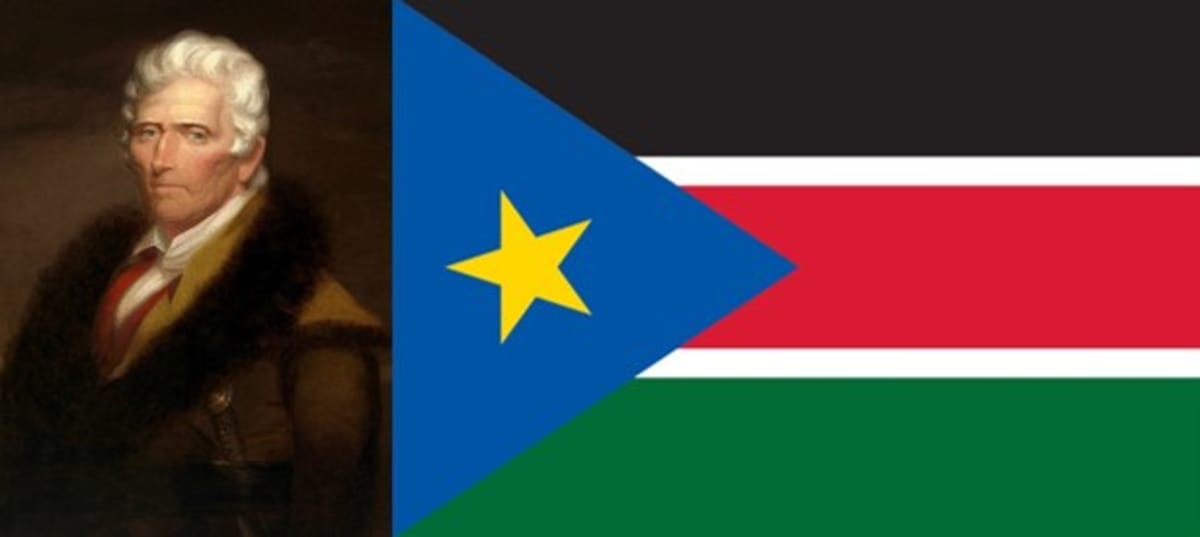Yes, you read that correctly. Daniel Boone and South Sudan’s independence.
“But wait,” you say. “Boone, that great American, who helped blaze a trail to what would become Kentucky, died in 1820, and South Sudan did not gain its independence until 2011. And to my knowledge, Boone never left his continent and certainly never traveled to Africa. What the heck are you talking about?”
Well, your facts are accurate, and perhaps I should clarify (read: admit) that Daniel Boone did not personally have a hand in South Sudan’s independence. I’ll explain further, but first, a backstory.
John Garang, a poor boy from a Sudanese village, was orphaned by the age of ten. Thanks to a relative who paid his school fees, he received a foundational education. While he was a student, a civil war broke out in his country, and when John turned seventeen, he joined the rebels who were fighting for representation and autonomy for his county’s southern region.
But even the rebels could see that John was a smart boy with much promise, and they encouraged him to continue his education. Following their advice, he completed high school in Tanzania and won a scholarship to attend university in the United States. In 1969, he earned a bachelor’s degree in economics from a college in Iowa and was subsequently offered another scholarship to pursue graduate studies in California. Instead, he returned to Tanzania to study as part of a fellowship program.
Still, John was not done being a rebel, and while in graduate school, he was affiliated with a student political group advocating for liberation movements in Africa. Soon after, he returned home and rejoined the rebels. He was sent to Israel for military training, and when a peace agreement was achieved in 1972, he became part of Sudan’s army. Within eleven years, and after completing an advanced course for officers at Fort Benning, Georgia, John rose through the ranks from captain to colonel. While in the United States again, he completed his master’s degree and followed that with a PhD.
John continued to hold on to the idea of a “New Sudan,” one in which all cultures, religions, and tribal ethnicities within the country could dwell together in unity, and he supported revolution to that end. When a second civil war erupted, he became part of the Sudan People’s Liberation Army. After more than two decades of war, a second peace agreement was reached in January 2005, and that same day, John was sworn in as the First Vice President of Sudan, the second most powerful person in his country.
Six months later, while retaining his vice presidency, John also became the premier of southern Sudan. Three weeks after that, he was dead, the victim of a tragic helicopter crash. Some claimed it was accidental; others believed nefarious elements were at play. What is not debated is that John’s advocacy for a “New Sudan” was a contributing factor to South Sudan’s ultimate independence that was gained six years after his death.
“So, what does all of this have to do with Daniel Boone?” you ask (and perhaps demand at this point).
In the early 2000s, John Garang visited my workplace (an international evangelical relief organization) in Boone, North Carolina, and I had a brief encounter with him. Following a small gathering at our office, my boss handed me the keys to his SUV and asked me to drive Mr. Garang to his hotel. In our less than half hour of making small talk en route to his accommodations, the topic of the town’s name came up, and thus ensued a discussion of Daniel Boone. At the time, I had no knowledge of Mr. Garang’s American education, and to my surprise, he told me when he was in the States in the late 1960s, he watched the “Daniel Boone” television show. We smiled as we conversed about this one of few commonalities between us – me, a small-town North Carolina boy who had achieved some degree of middle management, and him, a Wangulei village boy who had reached the upper echelons of one of Africa’s largest nations.
Okay, so maybe it wasn’t the actual Daniel Boone who played a role in South Sudan’s independence, but I’d like to think it was his indominable patriotism and independent spirit that had some reinforcing effect on Mr. Garang’s similarly held convictions. Like John Garang, Daniel Boone was a rebel and a revolutionary. Perhaps, while pursuing his early college education in Iowa and watching TV during his study breaks, Mr. Garang found some inspiration in Fess Parker’s portrayal of the great frontiersman…one pioneer’s influence upon another.
Who’s to say?
